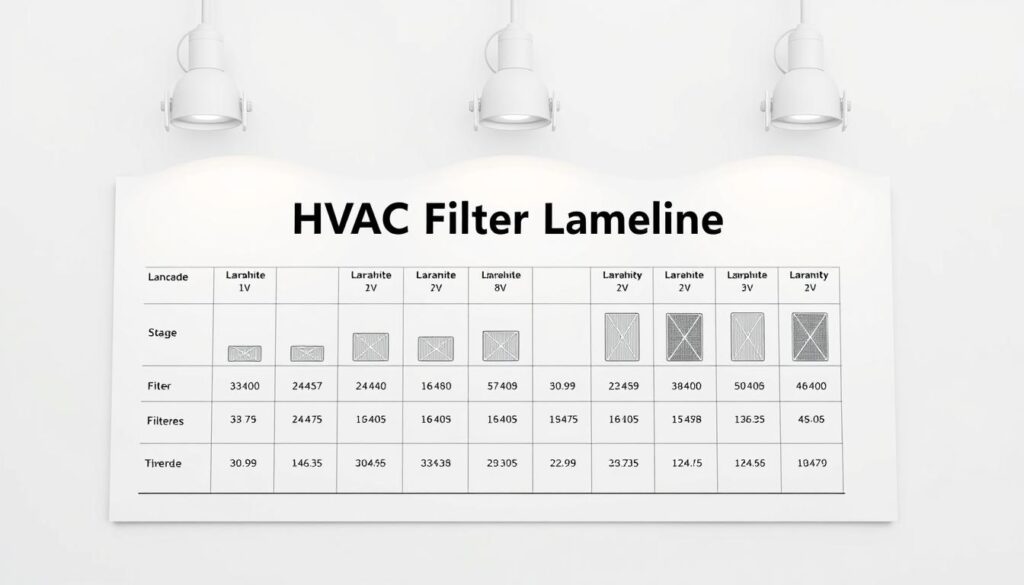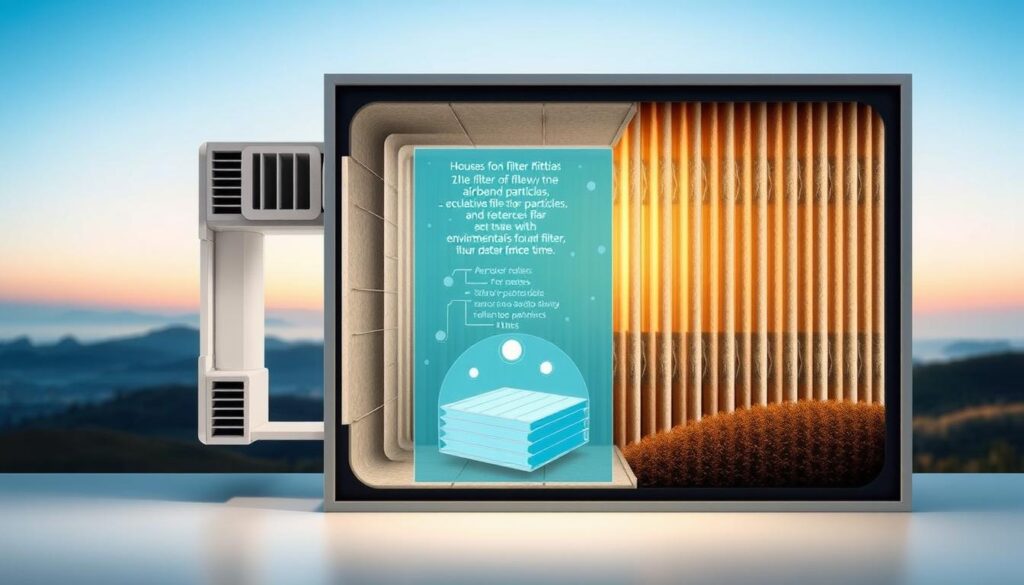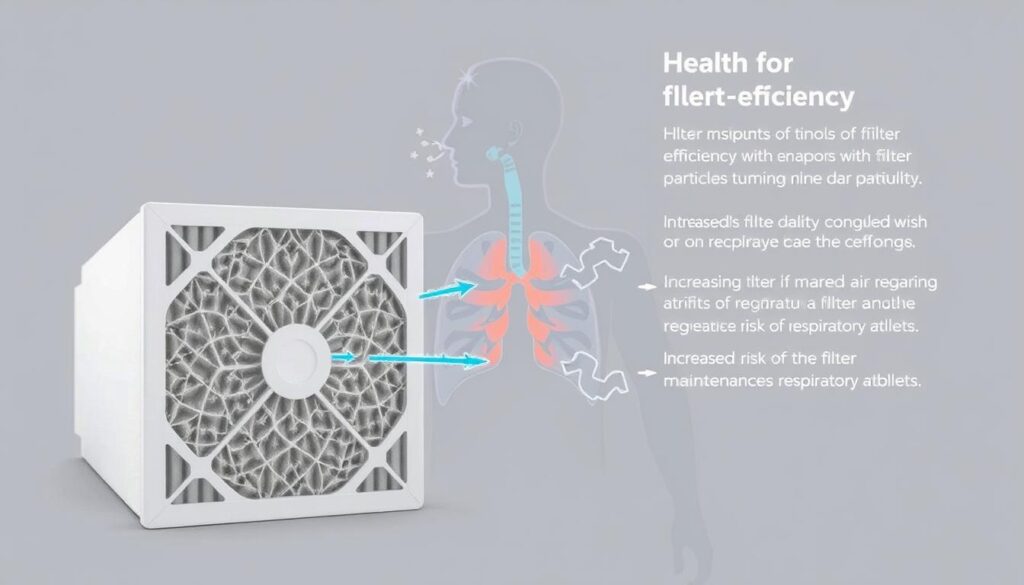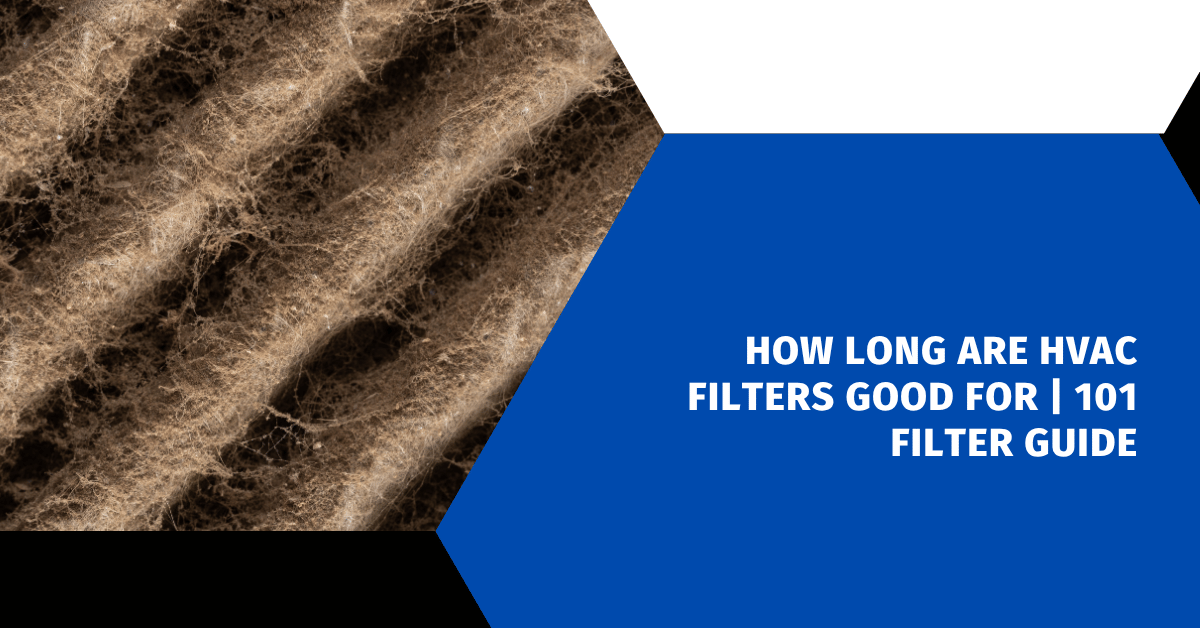Affiliate Disclosure
HVAC Guide Guys is a participant in the Amazon Services LLC Associates Program, an affiliate advertising program designed to provide a means for sites to earn advertising fees by advertising and linking to Amazon.
Ever thought about how often to change your home’s HVAC filter? Knowing how long they last can save you money and keep the air clean. It also helps your heating and cooling system last longer.

HVAC filters are key to keeping your air clean. They catch dust, allergens, and tiny particles, making sure your air is fresh. How long they last depends on a few things.
These filters are made of spun fiberglass or pleated paper, in a strong cardboard frame. Their job is to stop bad stuff from getting into your air system.
Key Takeaways
- HVAC filters play a critical role in keeping your air clean
- How often to replace them depends on the type and your home’s conditions
- Changing them regularly helps your system work better
- Different thicknesses need to be replaced at different times
- Things like your environment can affect how well they work
Table of Contents
Understanding HVAC Filter Basics and Their Function
HVAC air filters are key to keeping your indoor air clean and your heating and cooling system safe. They work quietly but are vital for your home’s comfort and health.
Air filters catch and remove airborne particles that go through your HVAC system. Knowing how they work is important for keeping them in good shape.
What Are HVAC Filters Made Of?
HVAC filters are made from different materials, each with its own benefits:
- Fiberglass filters: They’re cheap and offer basic protection.
- Pleated filters: These are made from cotton or polyester.
- Electrostatic filters: You can wash them or throw them away.
- HEPA filters: They trap particles very well.
How HVAC Filters Work
HVAC filters catch contaminants as air flows through your system. They’re rated by MERV (Minimum Efficiency Reporting Value), which goes from 1 to 16. The higher the MERV rating, the better they filter.
“A clean filter is the first line of defense in maintaining healthy indoor air quality” – HVAC Maintenance Experts
The Importance of Air Filtration
Changing your HVAC filter regularly is very important for several reasons:
- It removes dust, allergens, and tiny particles.
- It keeps your HVAC system parts clean.
- It makes the air inside your home better.
- It helps your system use less energy.
Pro tip: Experts say you should change your HVAC filters every 90 days for the best air quality and system performance.
Explore Our HVAC Shop
Looking for top-rated HVAC tools, parts, and accessories? Visit our shop and find the perfect solution for your needs.
Visit the ShopMERV Ratings Explained: Choosing the Right Filter Efficiency
Understanding MERV ratings is key for good hvac system air filtration. MERV (Minimum Efficiency Reporting Value) is a standard. It helps you pick the right filter for your home’s air quality.
The MERV rating scale goes from 1 to 16. Each level shows different hvac filter efficiency ratings. Here’s what these ratings mean for your indoor air quality:
- MERV 1-4: Basic filtration for larger particles like dust and pollen
- MERV 5-8: Improved indoor air quality, capturing smaller particles
- MERV 9-12: Excellent for homes with pets or allergy sufferers
- MERV 13: Hospital-grade filtration, capturing bacteria and smoke particles
Choosing the right MERV rating means finding the right balance. Higher isn’t always better. Very high MERV ratings can make your system work too hard.
“The sweet spot for most homes is a MERV rating between 8 and 13, providing optimal air quality without compromising system performance.”
| MERV Rating | Particle Capture | Recommended Use |
|---|---|---|
| 1-4 | Large particles | Basic residential use |
| 5-8 | Medium-sized particles | Improved home air quality |
| 9-12 | Small particles | Homes with pets/allergies |
| 13 | Bacteria, smoke | Advanced filtration needs |
Pro tip: Talk to an HVAC professional to find the best MERV rating for your system. The right balance ensures clean air and efficient system performance.
How Long Are HVAC Filters Good For: Standard Replacement Guidelines
Knowing when to replace your HVAC filter is important. It helps keep the air in your home clean and your system working well. The life of your filter depends on several things, but there are some general rules to follow.
The time you should replace your HVAC filter varies. Here’s a quick guide on how long filters usually last:
- Standard Homes: Replace every 90 days (3 months)
- Homes with Pets: Replace every 60 days (2 months)
- Homes with Allergies/Multiple Pets: Replace every 20-45 days
- Vacation or Infrequently Used Homes: Replace every 9-12 months
Basic Timeline for Different Filter Types
Different filters last for different times. Fiberglass filters need to be changed every 30 days. Pleated filters can go up to 90 days. High-efficiency filters like HEPA can last 6-12 months, depending on the model and how much you use it.
Factors Affecting Filter Lifespan
Several things can affect how long your filters last:
- How many people live in your home
- If you have pets
- The air quality in your area
- How often you use your HVAC system
- The conditions inside and outside your home
Signs It’s Time to Replace Your Filter
Look out for these signs that your filter needs to be changed:
- Visible dirt on the filter
- Less air coming out of your vents
- Higher energy bills
- Dusty surfaces in your home
- Strange noises from your HVAC system
Regular checks are important for your HVAC system’s health. Check your filter every month. Replace it when it looks dirty or if it’s time according to your home’s needs.
Types of HVAC Filters and Their Durability
Choosing the right HVAC filter is key to clean indoor air. Your HVAC system uses different filters, each with its own strengths and weaknesses.
- Fiberglass Filters
- MERV rating of 4
- Most affordable option
- Limited particle capture (about 20% of particles)
- Pleated Filters
- MERV ratings between 5-8
- More efficient particle trapping
- Can last up to 90 days
- HEPA Filters
- MERV ratings 11 or higher
- Remove up to 99.97% of airborne contaminants
- Ideal for allergy sufferers
Homeowners should think about their needs when choosing a filter. Higher MERV ratings mean better air but might work harder on your system. Most homes do well with filters between 8 and 13.
The filter you pick affects your air quality, system efficiency, and maintenance costs. Talking to an HVAC expert can help find the best filter for your home.
Explore Our HVAC Shop
Looking for top-rated HVAC tools, parts, and accessories? Visit our shop and find the perfect solution for your needs.
Visit the ShopImpact of Home Size and Occupancy on Filter Longevity
Your home’s size and layout greatly affect how long your HVAC filter lasts. Knowing what factors influence filter performance helps you keep your system running smoothly. This knowledge is key to maintaining your HVAC filters effectively.
Square Footage Considerations
The size of your home affects how fast your HVAC filter gets dirty. Bigger homes move more air, leading to:
- More air means faster filter clogging
- Bigger homes need filters changed more often
- Large homes’ HVAC systems work harder to keep air clean
Occupancy and Pet Dynamics
The number of people and pets in your home impacts your filter. More people and pets mean more dust and particles in the air:
- Single-person homes can go up to 90 days without a change
- Large families might need new filters every 30-60 days
- Pets add extra hair and dander, making filters less effective
Usage Patterns and Filter Life
How you use your HVAC system affects your filter’s life. Running it a lot or in dusty places shortens its life. Living in a busy city, near construction, or in areas with lots of pollen can cut filter life by 25-40%.
Pro tip: Regular maintenance can extend your filter’s life by 15-20%.
Environmental Factors Affecting Filter Performance

Your HVAC system’s air filtration depends on the environment. Different places can make your air filters get clogged faster. This means you might need to replace them more often.
In cities, pollution is a big problem. Emissions from factories, cars, and tiny particles in the air can harm your filters. This can make you need to change them sooner than usual.
- City dwellers may need to change filters every 30-60 days
- Regions with high dust or wildfire smoke require more frequent filter checks
- Coastal and humid areas can accelerate filter degradation
The weather also affects your HVAC system’s filters. Dry, dusty places like deserts can clog filters quickly. On the other hand, humid places can lead to mold and less effective filters.
Seasonal changes also play a part. During wildfire seasons or when pollen is high, filters work harder. It’s important to check them often to keep the air clean and your system running well.
Protecting your HVAC system starts with understanding your local environmental conditions and their impact on air filtration.
The Role of Seasonal Changes in Filter Maintenance
Your HVAC system works hard all year, adjusting to temperature and environmental changes. Knowing how seasonal shifts affect hvac air filter maintenance helps keep your system running well and lasting longer.
Seasonal changes greatly affect your HVAC system’s work and filter condition. In mild spring and fall, your system works less, so filters get dirty slower. But, in peak heating and cooling seasons, you need to follow more intense hvac air filter best practices.
Summer vs Winter Filter Considerations
Different seasons bring different challenges for air filters:
- Summer increases cooling demands, potentially causing up to 30% higher energy consumption
- Winter heating systems run continuously, creating more strain on filters
- Humidity levels impact filter performance and system efficiency
Seasonal Maintenance Recommendations
To keep your HVAC system running well, follow these seasonal maintenance tips:
- Inspect filters monthly during peak seasons
- Schedule professional maintenance twice annually
- Replace filters every 30-90 days
Regular filter maintenance can improve system efficiency by 5-15% and reduce energy costs.
By adjusting your maintenance to the seasons, you’ll get cleaner air, better energy use, and a longer-lasting HVAC system.
Explore Our HVAC Shop
Looking for top-rated HVAC tools, parts, and accessories? Visit our shop and find the perfect solution for your needs.
Visit the ShopHealth Considerations and Filter Replacement Frequency

Your home’s air quality is key to your family’s health, more so for kids and those with breathing problems. Following residential HVAC filter guidelines is vital for a clean indoor space.
Children are very sensitive to indoor pollutants. Dust, mold, pollen, and pet dander can cause breathing issues and allergies. Choosing the right air quality and HVAC filters is critical for your family’s health.
- Replace filters every 1-3 months for optimal air quality
- Use high-efficiency pleated filters for better contaminant removal
- Consider more frequent replacements for homes with pets or allergy sufferers
Homes with health concerns need to focus on filter upkeep. Families with asthma or breathing issues should change filters more often.
| Household Condition | Recommended Filter Replacement |
|---|---|
| Standard Home | Every 90 days |
| Home with Pets | Every 60 days |
| Allergy Sufferers | Every 30-45 days |
Signs you need a new filter include reduced airflow, more dust around vents, and worsening breathing symptoms. Keeping filters clean can save energy and improve your home’s air quality.
Common Signs of a Worn-Out HVAC Filter
Knowing when to replace your HVAC filter is key for clean air and system health. Your filter needs to be changed based on several important signs.
Here are the main signs that your HVAC air filter needs attention:
- Visible Dirt and Discoloration: A dirty, dark filter means it’s full of dust and dirt
- Less air coming from vents, showing air can’t move freely
- Higher energy bills without reason
- More times your HVAC system turns on and off
- Dust builds up around vents more often
The light test is a simple way to check if your filter needs to be changed. Hold your filter up to a light. If light barely gets through or not at all, it’s time for a new one.
| Filter Warning Sign | Potential Impact |
|---|---|
| Excessive Dust | Lower Air Quality |
| Higher Energy Bills | System Works Less Efficiently |
| Restricted Airflow | System Strains |
Ignoring these signs can damage your HVAC system. Replacing filters regularly keeps your system running well, improves air quality, and saves you from costly repairs.
Professional Recommendations for Filter Maintenance
HVAC experts say keeping filters clean is key for your system’s best performance. They follow commercial standards for when to replace filters, based on where you live and the type of filter. Most say to check your filter every month and change it every 30 to 90 days.
This helps keep the air in your home clean and your system running smoothly. If you have pets or allergies, or if your home gets a lot of dust, you might need to change filters more often. For example, pet owners might need to change filters every 60 days. People with breathing problems might need to change them every 20 to 45 days.
Seasons also play a big role in how often you need to check and replace filters. HVAC pros suggest more frequent checks and changes during the hottest and coldest months. If you live in a place with lots of pollution or dust storms, you’ll need to be even more careful with your filters.
Industry Standards
The American Society of Heating, Refrigerating and Air-Conditioning Engineers (ASHRAE) has rules for filter care. These rules help your HVAC system last longer and keep the air in your home clean. By following these tips, you can make sure your home has clean, fresh air all the time.

